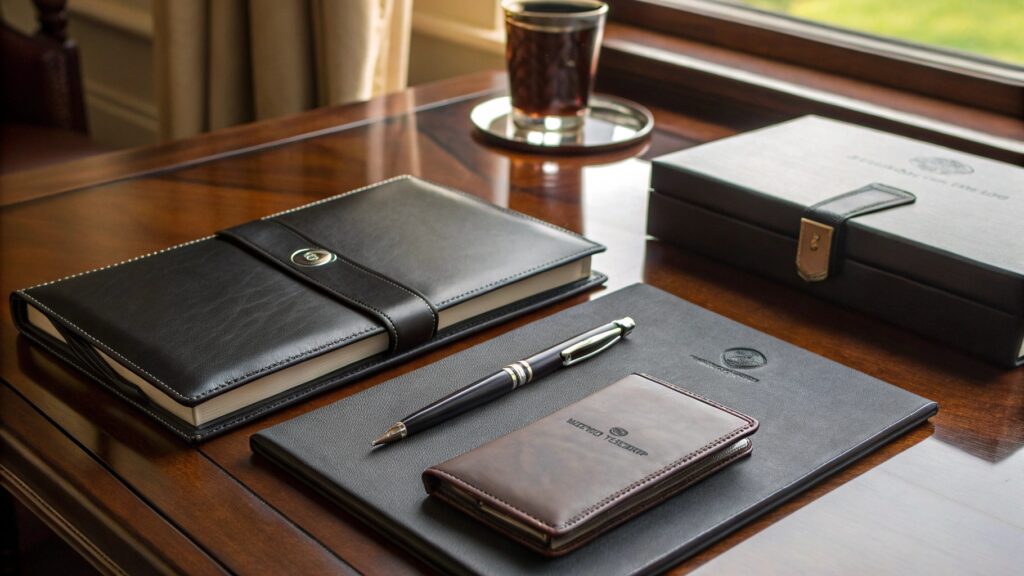The Meaning of Business Gifts: A Strategy for Building Relationships
The true value of business gifts goes far beyond the object itself. In a world where emails are automated and relationships are often transactional, a well-chosen business gift becomes a rare human gesture—one that signals appreciation, attention, and long-term thinking.
Business gifts are a powerful strategic tool for building and nurturing relationships by communicating appreciation and sincerity. They serve as a tangible reminder of a connection, reinforcing trust and keeping a brand top-of-mind long after a meeting or transaction has concluded.

I've learned that the most effective business gifts aren’t flashy or expensive—they’re thoughtful. A custom notebook with a handwritten note, a sustainably made tote bag with the recipient’s name subtly printed, or even a locally sourced snack box—these gifts don’t just say “thank you.” They say, "I see you."
Strategically, business gifts are powerful brand assets. They bridge emotional gaps, reinforce trust, and often reopen conversations that would otherwise fade. When done right, a gift becomes a memory trigger—it anchors your brand in someone’s daily life, long after a meeting ends. The key insight is that business gifts aren’t about the moment they are given; they are about the relationship they quietly nurture over time. In a digital world, that kind of tangible sincerity is more valuable than ever.
Why Do We Give Corporate Gifts?
Are you wondering about the real reasons behind giving corporate gifts1? Do you want to understand the strategic and emotional drivers that make gifting a crucial part of business relationships?
We give corporate gifts to strengthen professional relationships, show appreciation to clients and employees, and enhance brand visibility. Gifting is a powerful way to make a human connection in a digital world, fostering goodwill and demonstrating that you value the people you work with beyond transactional interactions.

My experience has shown me that giving a corporate gift is never just a transaction. It’s always a message. From my time in the printing factory to my work at Latitude, I’ve seen how a physical item can carry emotional weight.
What are the Key Reasons for Corporate Gifting?
Corporate gifting serves many purposes. It is a business practice. But it is also a human one. It helps build trust. It also helps build loyalty. Here are the main reasons we give corporate gifts.
| Reason | Description | Strategic Benefit | Example |
|---|---|---|---|
| Appreciation & Recognition | To thank clients for their business or employees for their hard work. | Fosters loyalty, builds rapport, and encourages continued partnership. | A premium coffee mug for a long-term client or a gift card for a top-performing employee. |
| Brand Building | To keep your brand top-of-mind with a tangible item. | Increases brand recall, creates a positive brand image, and stands out from competitors. | A branded, high-quality notebook or a sleek, custom-designed pen. |
| Relationship Building | To establish new connections or strengthen existing ones. | Deepens professional bonds and opens doors for future opportunities. | A welcome kit for a new business partner or a small gift after a successful first meeting. |
| Celebrating Milestones | To mark special occasions like holidays, anniversaries, or project completion. | Reinforces the human element in business and creates positive memories. | A gourmet food hamper for the holidays or a customized plaque for a work anniversary. |
| Lead Generation | To entice new prospects or follow up after an event. | Makes your company memorable and increases the chances of a follow-up conversation. | A gift box sent to a potential client after a trade show. |
| Employee Engagement | To make employees feel valued and part of a team. | Boosts morale, increases job satisfaction, and reduces employee turnover. | A branded hoodie for a team event or a wellness kit for a remote team. |
| Sales & Marketing | To support a marketing campaign or drive a specific sales goal. | Can be used as a call to action or a reward for a survey or purchase. | A branded power bank given with a new product launch. |
| Onboarding | To welcome new employees and make them feel part of the company culture. | Creates a strong first impression and helps new hires feel integrated quickly. | A custom tumbler, notebook, and welcome letter in a branded box. |
I once helped a mid-sized trading company in Singapore with their client appreciation2 gifts. They wanted to do more than just send an email. We created small, personalized gift boxes with a high-quality leather cardholder and a handwritten note. The feedback was immediate and positive. Clients mentioned feeling truly valued. It showed me that the effort and thought put into a gift is what truly matters, and that is why we do it.
What Is the Value of Corporate Gifting?
Are you trying to justify a corporate gifting budget and need to articulate the real return on investment? Do you want to understand how a simple gift can have a significant impact on your business's bottom line and long-term success?
The value of corporate gifting lies in its ability to build emotional connections that translate into tangible business benefits. It enhances customer loyalty, improves employee retention, and strengthens brand perception. These human-centric gestures lead to repeat business, positive word-of-mouth, and a stronger, more engaged community around your brand.

At Latitude, we don’t just sell products; we sell experiences. The value of a corporate gift is not in its price tag, but in the feeling it creates. This is a core part of what I've learned in my years in this industry.
How Does Gifting Create Tangible Value?
Corporate gifting creates real value. It is not just an expense. It helps a business grow. It builds lasting relationships. This is how a gift becomes an investment.
| Value Created | Description | How It Impacts the Business | Measurement of Success |
|---|---|---|---|
| Increased Client Loyalty | Gifts make clients feel valued and appreciated. | Reduces client churn, encourages repeat business, and increases customer lifetime value. | Higher client retention rates, positive feedback, and new referrals. |
| Improved Employee Morale | Gifts show employees their hard work is noticed and valued. | Boosts motivation, increases productivity, and lowers employee turnover. | Higher employee satisfaction scores and lower recruitment costs. |
| Enhanced Brand Reputation | Thoughtful, high-quality gifts reflect positively on your brand. | Positions your brand as caring, professional, and attentive to detail. | Increased social media mentions, positive brand sentiment, and public image. |
| Strengthened Partnerships | Gifts to partners reinforce mutual respect and shared goals. | Fosters stronger collaborations and more effective teamwork. | More successful joint projects and positive partner testimonials. |
| Memory & Recall | A tangible gift serves as a physical reminder of your brand. | Keeps your brand top-of-mind, making it more likely for people to choose you later. | Brand recall surveys and direct mentions from clients. |
| Emotional Connection | Gifts create a personal bond that goes beyond business. | Builds trust and makes relationships more resilient. | Stronger relationships, more open communication, and personal rapport. |
| Competitive Advantage | Gifting done right helps you stand out in a crowded market. | Differentiates your brand from competitors who use generic or no gifts. | Higher market share and a more loyal customer base. |
| Sales & Marketing ROI | Gifting can be tied to specific campaigns to generate leads or sales. | Creates direct return on investment through new business. | Increased lead conversion rates and sales figures tied to the campaign. |
I remember working with a company that was losing clients to a competitor. We implemented a strategy of sending small, thoughtful gifts to their key accounts. We used high-quality, custom-branded wireless chargers and notebooks. Within six months, they reported a significant drop in client churn and an increase in positive client feedback. This showed me that the value of corporate gifting is not just a theory; it is a measurable business strategy.
What Is the Meaning of Business Gift?
Are you looking for a clear definition of a business gift3 and its purpose in the corporate world? Do you want to understand the etiquette and intention behind this professional gesture?
A business gift is a present given to a client, employee, or partner to express appreciation, strengthen a professional relationship, or commemorate a special occasion. The meaning of a business gift is to convey a non-transactional, human-centric message of gratitude and respect, thereby building goodwill and fostering loyalty beyond formal business dealings.

I've learned that a business gift is a language. It speaks volumes without saying a word. In my years of helping businesses in Singapore with their gifting strategies, I’ve found that the meaning is always more important than the material.
What are the Core Elements of a Meaningful Business Gift?
A business gift has a clear meaning. It should be thoughtful. It should also be appropriate. This helps the gift have the right impact.
| Element | Description | How to Implement | Why It's Important |
|---|---|---|---|
| Thoughtfulness | The gift shows you have considered the recipient's preferences or needs. | Personalize the gift with their name, or choose an item related to their interests. | Makes the recipient feel seen and valued as an individual, not just a contact. |
| Appropriateness | The gift is suitable for the professional context and occasion. | Choose a gift that aligns with industry standards and company culture. | Prevents misunderstandings and ensures the gift is well-received. |
| Branding (Subtle) | The company's logo is present, but not overwhelmingly so. | Opt for a debossed logo on a leather item or a simple brand name on packaging. | Reinforces brand identity without making the gift feel like an advertisement. |
| Quality | The gift is well-made and durable. | Choose high-quality materials and reputable suppliers. | Reflects positively on your brand's commitment to excellence. |
| Utility | The gift is practical and can be used in the recipient's daily life. | Select items like notebooks, mugs, or tech gadgets that they will use regularly. | Ensures the gift is valued and provides repeated positive brand exposure. |
| Timing | The gift is given at a meaningful time, not randomly. | Deliver gifts for holidays, work anniversaries, or after a major project. | Creates a stronger memory and reinforces the intention behind the gesture. |
| Personal Note | A handwritten card or message is included with the gift. | Always add a personal, sincere note that explains the reason for the gift. | Adds a human touch and makes the gesture feel authentic and genuine. |
| Presentation | The gift is well-packaged and looks appealing. | Invest in nice wrapping, a custom box, or a branded tote. | The first impression matters and enhances the perceived value of the gift. |
I once helped a client in Singapore select a gift for a long-term business partner. Instead of a generic item, we found a local artisan who made beautiful, custom-engraved leather journals. We presented it with a personal card. The partner later said it was the most thoughtful gift he had ever received. It was a simple gesture, but it perfectly conveyed respect and gratitude, strengthening their relationship for years to come.
Conclusion
A business gift is more than a present; it is a strategic tool that builds relationships. By focusing on thoughtfulness, quality, and a human touch, a gift can create lasting emotional connections that translate into significant business value and goodwill.





